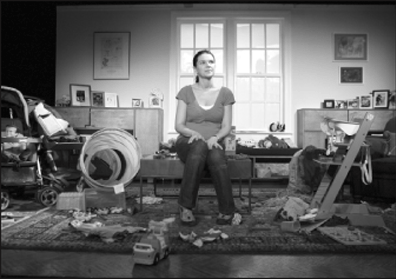By Michele Firpo-Cappiello
What is an eight-and-a-half-months pregnant mom with puffy ankles, an aching back, and hormones cranked up to high doing at an off-Broadway play on a Saturday night? Laughing her oversized backside off through Amy Wilson’s one-woman play, “Mother Load.”
Written and performed by Wilson and directed by Julie Kramer, the 80-minute, slightly panicked fusillade strikes a chord with the experienced and introduces the uninitiated to such mommy trials as infertility treatment (You give yourself a shot where?), labor and delivery (What’s an episiotomy?), diapering (A baby will decorate her crib with actual poop?), breastfeeding (Really? Blood blisters?), and the many other rude awakenings — literal and figurative — that come with becoming a parent. Wilson gently but firmly delineates the differences between a dad’s experience and a mother’s, but makes all of the troubles comical.
Although not all of us moms live in the hypercompetitive world of Manhattan, we, too, have toted the “mother load” Wilson is carrying. We’ve felt the pressure to nurse on demand (in spite of extreme sleep deprivation); to find the perfect stroller (which doesn’t exist); and to charm admissions counselors at the best preschools (who seem to be judging us for every decision we’ve made since our baby was first placed in our arms). By revealing her struggles, Wilson helps those of us seeking perfection — not just in motherhood but in any endeavor — to forgive ourselves for never attaining what is unattainable, and not that important after all.
The show’s pacing is flawless, the production seamless. Kramer, a long-time friend of Wilson’s, helped develop the show and continues to guide it as Wilson’s own life as a mother evolves. Kramer’s keen direction demonstrates her love for the besieged mommy onstage, but recognizes that her battle must be fought and won for truly good mothering to succeed in a world that values quantity over quality and designer labels more than a hug.
The spot-on scenic design beautifully supports Wilson’s confident and friendly acting style. Anyone who’s lived in or visited a house with small children will recognize the set’s appropriate messiness: a living room cluttered with toys, strollers, a high chair, photos, books, unfolded laundry, and the requisite bottle of antibacterial spray. The sound and lighting design allow Wilson to interact with and create multiple well-formed and funny characters to further burden her frazzled mommy. The voiceovers begin with the softly modulated tones of a meditation tape but quickly turn into harangues bent on destroying a new mother’s happiness and an overtired mom’s peace. And the sudden, noirish lighting effects capture the desperate moments of revelation and confrontation Wilson faces when self-doubt threatens to overwhelm her.
Wilson uses the props naturally, doing two or three things at once just like any mom would, steadily straightening up the mess her day has made. While she’s stacking parenting magazines, she enumerates the many ways their articles have frightened her. Sorting the mail allows her to specify all the ways she is impeding her newborn’s development. While she’s folding laundry, she reveals her encounter with a “sanctimommy” who informs her that it may be too late for her to get her one-year-old into a good preschool, thereby foiling any chance he had to go to a “TT” (top tier) college. The cleaning becomes an analogy for this mother’s search for perfection.
However, the best moment in the play comes when Wilson rejects perfection. The living room is almost tidied up when the wicked voiceover attacks the mother on all sides, finally prompting her to fling Lincoln Logs, just-folded laundry, and plastic toys in a gleeful fit. She lets go of control and embraces happiness for herself and her children. And we feel the release. It may have been partly because of my hormones, but this mama left the theater with tears in her eyes.


















